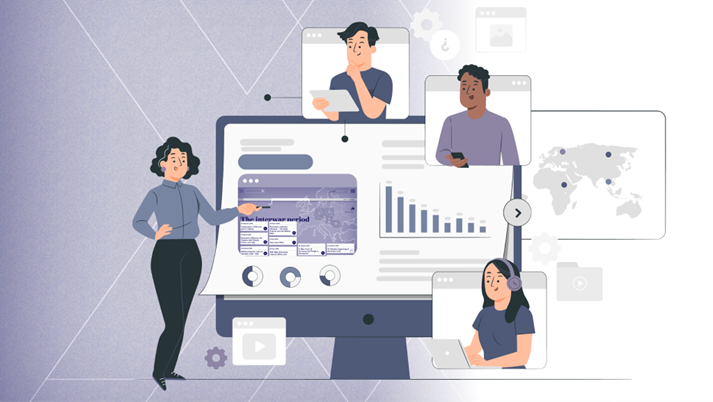Within the series of the webinars for teachers and educators ‘Hi-story Lessons – methods and resources for history teaching’ delivered by ENRS, which were conducted as part of the Hi-story Lessons project, experts presented ready-to-use educational resources, gave practical advice on how to use them and discussed how to talk to students about 20th-century history from the perspective of different European countries.
Hi-story Lessons is a multilingual, web-based educational project aimed at secondary school teachers and students. The platform offers various educational resources such as infographics, animations and interactive timelines with a list of events from the 20th century and are available in English, Polish, German, Slovak, Czech, Romanian and Hungarian. These practical models are designed to help integrate new media into the classroom and enable teachers to deliver lessons raising awareness of different thoughts on the same historical issue. The project focuses on fostering engaged learning and developing basic skills that help students become tolerant global citizens.
The webinars are dedicated to educators and teachers working with students aged 13-18. Their contents are particularly valuable for teachers of history and civic education, but nevertheless they are also useful for teachers of all other subjects. All webinars are held in English. So far three took place. In the following, we will outline the subject matter of each webinar to give an general overview of what to expect to learn from it.
Towards Holocaust education
The webinar ‘Resources for history teachers: a pedagogical kit about the Holocaust’ was presented by Martyna Grądzka-Rejak, who developed the educational resources together with Professor Piotr Trojański from the Pedagogical University of Krakow. The idea to create these teaching materials stems from an exhibition entitled ‘Between Life and Death: Stories of Rescue during the Holocaust’ prepared by European Network Remembrance and Solidarity.
The exhibition "Between Life and Death: Stories of Rescue during the Holocaust" deals with the experiences of people who hid from the Nazi German extermination machinery as well as with the fate of the people who helped them. Find out more: click here
‘We were aware that the local population of the occupied countries had to make decisions in the face of the genocide of the Jews that they could never have imagined: How should they react to these mass atrocities?’ says Grądzka-Rejak.
With the educational kit Grądzka-Rejak and Trojański wanted to further explore the themes of the exhibition. The materials comprise archive photos, short films and summary tasks for students. The content of the topics ranges from explanations of the course of the genocide to the presentation of the situation of the countries in relation to their political, social and everyday life under German occupation, to dealing with the question of complicity. As Grądzka-Rejak summarises:
‘With the pedagogical tools, especially with the stories of people who have kept their integrity and humanity, we hope to encourage students to fight prejudices and different kinds of phobias, so that they know which attitude to choose.’
No to disinformation
Within the webinar ‘How to spot historical fake news? Resources and tools for history teachers’ Łukasz Kamiński explained how to verify information available online and showed that disinformation has been present in our communication for centuries. Although it was first believed to be a problem of the past, “with the next revolution of spreading information, meaning the invention of the internet and appearance of social media, a completely new situation has been created which unfortunately opened new and great possibilities to spread fake news and disinformation.” Historical disinformation is a very dangerous phenomenon. Especially because the past is a very sensitive area of social interaction, many (negative) emotions can be generated when disinformation targets this area. The aim of the webinar is to highlight simple methods and resources available online to help verify information.
“Historians have specific skills which help them debunking disinformation” says Kamiński.
Thus, by teaching students the basic methods used by historians, the chances are increased that they avoid being manipulated by the creators of fake news. Kamiński presented various animations, publications, topics and pre-prepared assignment as well as lessons dedicated to the issue of disinformation.
Expanding perspectives on the Holocaust
The webinar ‘Resources for history teachers: International Holocaust Remembrance Day’ was introduced by Julia Mayer, who talked about how to prepare interactive lessons with students for discussing the Holocaust by using the respective educational materials available on the Hi-story Lessons platform. Mayer primarily reports on her experiences with the teaching materials on the topic of ‘The different ways Jews were helped during the Holocaust’ which she used in her class and gives general advice on how to prepare students for dealing with the subject.
“In choosing this topic, I wanted to shed light on the history of the Holocaust from a different perspective, and I think the subject matter is particularly well suited to exploring the question of responsibility.”
Step by step, Mayer led through her lesson and explained in detail her approach on how to create an interactive learning space for students using the materials provided on Hi-story Lessons. She also points out to the responsibility to present the diversity of Jewish life, thus contributing to break down stereotypes.
We encourage you to watch the webinars to find out more about how to employ the educational materials in your class. The videos are available on our YouTube-account click here
The series of webinars are delivered by Urszula Bijoś, coordinator of the 'Hi-story Lessons: Teaching 20th-century European History' project
Wtitten by Tatjana Smudzinski
